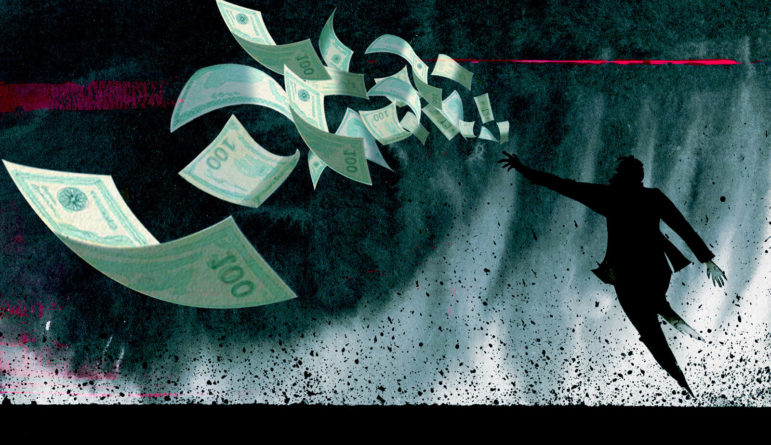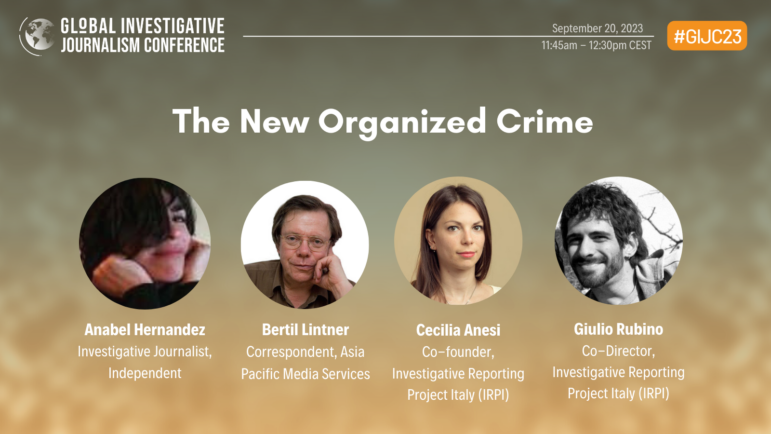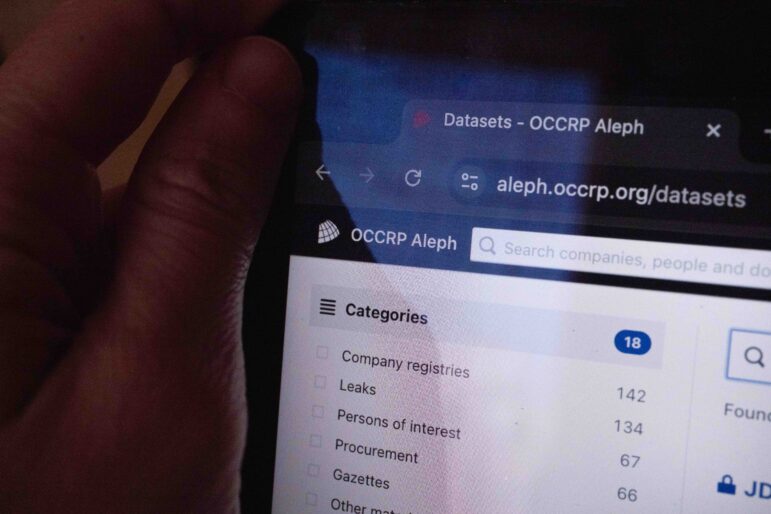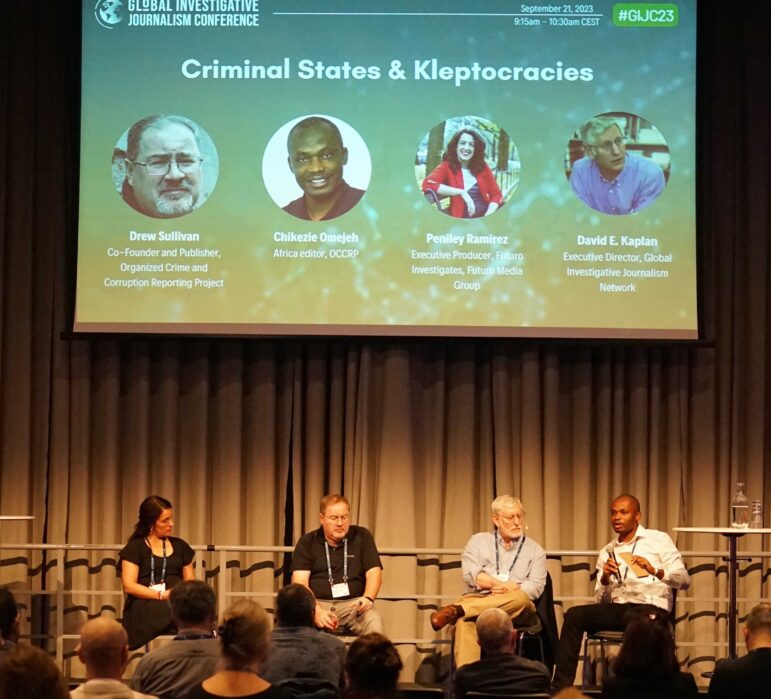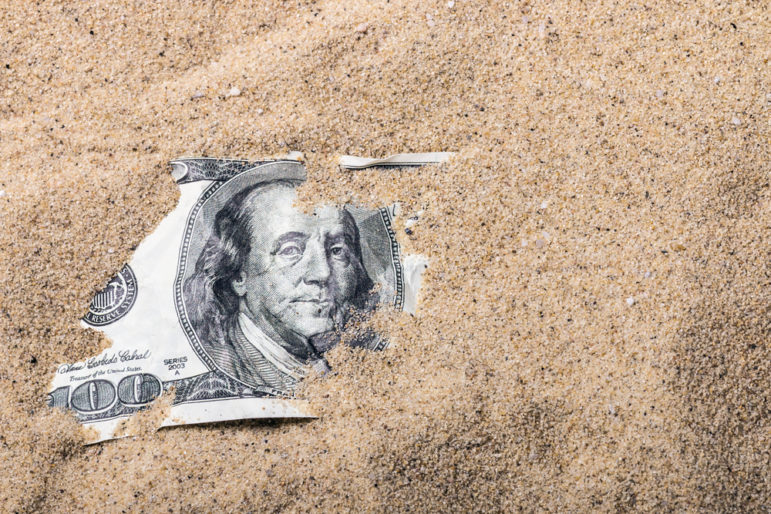

Image: Shutterstock
Tips for Linking Shell Companies to their Secret Owners
For investigative journalists, the search for the actual owners of shell companies and trusts can sometimes seem as elusive and “fuzzy” as popular searches for UFOs. But there are powerful tools out there that can help newcomers to this complex field track breadcrumbs to people who go to great lengths to hide assets that the public should know about.
Shell corporations are companies that don’t actually do any business, but which are often incorporated for strategic reasons, such as legal tax avoidance for legitimate corporations — and also to hide the identity and assets of the individuals who truly control illegitimate or sanctioned enterprises.
Digging into shell companies and their ultimate benefit owners (UBOs) is a specialized investigative area, represented by networks such as the International Consortium of Investigative Journalists (ICIJ) and the Organized Crime and Corruption Reporting Project (OCCRP). The advanced techniques they use, from tracking bank transfer routes to deferred corporate prosecution agreements, could fill several books.
However, in a solo presentation at the recent 2024 NICAR data journalism summit in the US, Karrie Kehoe, deputy head of data and research at ICIJ, shared several tips, tools, and places to start that almost any reporter can try to track the person at the top of a shady empire — and their overseas assets. Kehoe invited attendees to first ask themselves: What words might appear in paperwork that must be filed for these front companies? And to then experiment with possible variations of those words that could be used in corporate registries and databases. For instance, might the name of a director or owner, like Ian, appear as “Iain”?
While often partly obscured by secrecy jurisdictions — such as the British Virgin Islands, Panama, Cyprus, or Cayman Islands — shell companies always need paperwork in order to be incorporated. Kehoe also invited reporters to think carefully about the people typically paid to fill out these forms, also known as “formation agents.” It’s their job to create companies for wealthy clients in friendly legal jurisdictions, which can offer country registration fees as low as US$14. For extra fees, formation agents can also provide clients with bank accounts, “straw man” director names, and secretarial services. But they can’t get around the basics on those forms: an official business address, real names of at least some directors, and documents about the nature of the business.
Searching for foreign assets of a Middle East king in 2021, Kehoe and her colleagues found that the monarch secretly owned 14 luxury homes in the UK and the US via a network of front companies in tax havens. They then got dramatic confirmation when the secret client’s home address was listed by formation agents in registration documents as the kingdom’s “royal palace.”
Remember, she stressed, that you are always seeking the ultimate beneficial owner, rather than the director or owner names you may find early in your search.
“You could be sitting in the Netherlands, and you get your order off to a formation agent in, say, Hong Kong, and he starts setting up shells for you in the Cook Islands, Singapore, and other places,” said Kehoe, explaining one possible scenario. “From there, they will provide secretarial services, an address for you, and straw men — in other words, figureheads. One could be listed as the director of 100 companies, and that person could be a taxi driver in Azerbaijan. He has nothing to do with this — they may get a small bit of money; sometimes they are relatives or just people they know; sometimes they are strong-armed. But he is a body the formation agent needs.”
Shell companies represent one of several kinds of “proxy” methods that people use to disguise their wealth, as investigative journalist Will Neal recently explained at OCCRP. For more on this, see GIJN’s detailed resource for Researching Corporations and their Owners, which includes access portals for annual reports, and links to country-specific registries, from Germany to Hong Kong.
Here are some of the places-to-start tips Kehoe shared at NICAR24.
Start with a quick company or person name search in OpenCorporates. Drawing on company records from more than 140 government registries, OpenCorporates is a vast, open database that reporters love. “The first thing I do is go to this wonderful, searchable database – it has over 220 million companies listed there,” explained Kehoe. “It is wonderful for some jurisdictions; it struggles for others. For instance, you’d need to go somewhere else for Irish shell companies. If you want to look up a whole lot of companies, they do have API access too.”

OpenCorporates is a vast, open database drawing on company records from more than 140 government registries. Image: Screenshot, OpenCorporates
Consider a subscription to a corporate risk database if you hit a wall with open source tools. Kehoe showed one major shell company name that got no hits on the excellent OpenCorporates database, but which got a detailed profile from a simple name search in the paid-for Sayari corporate risk platform– including helpful red flag icons to show sanctions listings, and national flags to show countries associated with listed directors. “This is a database I use all the time — it’s subscription-based, but they also have some free trials,” she said. “There are also other great paid-for corporate databases like Orbis and Factiva.”
Put yourself in the shoes of billionaires and oligarchs. Kehoe said it helps to refine database and registry searches for places and interests that appeal to the egos of oligarchs and UBOs. “The thing about super wealthy people is that they’re very predictable, and, if you’re a billionaire, there is only so much stuff you can buy,” Kehoe noted. “They often want luxury properties in London and the South of France; they want mega-yachts and jets and art and sports teams.” Simply identifying and searching for the wealthiest neighborhoods in certain jurisdictions, she said, can help narrow searches for hidden assets.
Use vetted investigative data in the ICIJ Offshore Leaks Database. Many reporters don’t realize that the vast, searchable Offshore Leaks database — with vetted information on 810,000 offshore companies, foundations, and trusts in 200 countries — is freely available for any reporter, anywhere, to use, and to explore for new stories in their regions. “Please use it,” she said. “We know there are more stories in all that data, and we want reporters to find them.” Compiled by ICIJ, the database has been built from previous leaks and collaborative investigations into secret offshore assets and their hidden owners, such as the Panama Papers, the Pandora Papers, the Bahamas Leaks, and the Paradise Papers projects. “You can just put addresses into the search box, or the names of people or companies,” she explained. Reporters can also filter their search by the major leak investigations, which focus on different regions and jurisdictions — so a filter for Pandora Papers, for instance, will highlight more Asia data than Panama Papers.
Kehoe added one note of caution: “Just because someone’s name appears in this database does not mean they are guilty or associated with any wrongdoing at all. It just means they’re listed in an offshore jurisdiction.” (See ICIJ’s video tutorial series for advanced search techniques for this database.)
Flag potential criminal links in OCCRP’s follow-the-money archive. OCCRP’s Aleph database has information on 340 million public entities in 141 countries. “It also has persons of interest datasets and gazettes,” said Kehoe. “Gazettes are huge in Europe — if a company is struck off [from company registers], it has to be listed in a gazette.” (Limited companies are typically struck off, or removed, from official registers for regulatory non-compliance, and are prohibited from further trading.) She added: “(Aleph) also has lots of court records, which is important for many countries, because most countries don’t have a court records tool like Pacer in the US.”
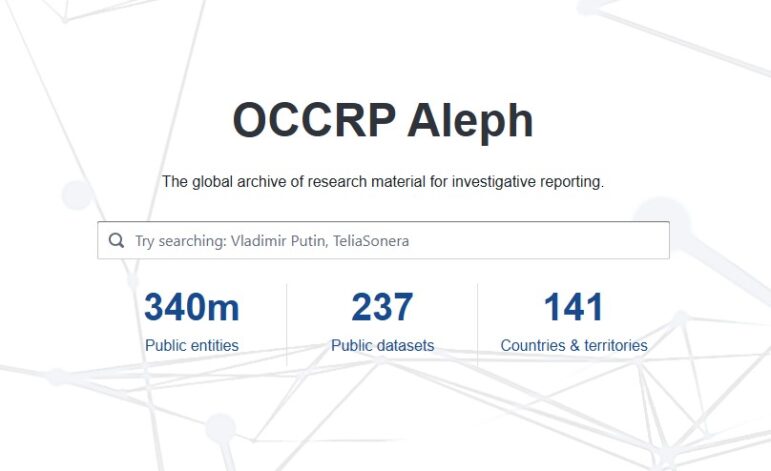
OCCRP’s Aleph database has information on 340 million public entities in 141 countries. Image: Screenshot, OCCRP Aleph
Experiment with different spellings — and check against Google Maps. Using the name of her own hometown in Ireland as an example, she said reporters searching for people or assets in Dún Laoghaire should also try spellings such as “Dún Laoire” and “Dunleary.” “If you try different spellings for places, you’d be surprised what you come up with,” she said. “Leaks data comes from many different languages, so if you want to find an address in Russia, there’s no point entering the word “street.” I recommend going to Google Maps, and, in this case, taking the Cyrillic phrase, and putting the English translation of that phrase into the search field of databases.” Even more important: use alternate spellings for the names of directors listed in corporate registries. This can be as simple as trying traditional alternatives, such as “Ann” and “Anne.” “But remember that when looking at Russian names, in particular, the spellings often change – “i”s become “y”s, “x”s become “ks”s etc,” Kehoe explained.
Tip: Enter addresses you find on OpenStreetMap, and check to see whether the director’s listed address is the mansion you’d expect, or a tiny office or apartment that could signal another false front.
Cross-search the “nuggets” you find in other free portals. Kehoe suggested the following sites as other useful, free resources to search for hidden cross-border business connections: Open Ownership, the UK-based Register of Overseas Entities, and Tenders Electronic Daily (TED). “TED is amazing — it involves public contracts for 27 EU member states, and it goes back a long time,” said Kehoe. “But it can be a little tricky as it has many different languages together.”
Tip: Image search for society photos of the oligarch or UBO you’re investigating with the names listed in datasets and corporate registries as company directors.
Try a family connections tool to track oligarch assets. “Russian oligarchs are the world masters of shell companies — they’ve been doing this since the 1990s, and reporters are always playing catch up,” said Kehoe. “The first thing to do is to check if they are sanctioned.”
She suggested a website called RuPEP, which profiles thousands of “politically exposed persons” and sanctioned individuals in Russia, Belarus, and Kazakhstan, as well as their relatives, and their association with legal entities. She added: “These kinds of databases often give you nuggets of new information, but it’s a great place to start. This has profiles for a lot of oligarchs, and the research is amazing,” said Kehoe. “It gives you family members, which is important because a lot of the assets are in family members’ names.”
Paperwork tends to poke holes in secrecy — so keep digging. “Be persistent,” Kehoe advised. “Ultimate beneficial owners really do trust their formation agents to keep them safe from scrutiny, and share a lot of stuff with them. And so, somewhere down the line, they send in a scan of their passport or their utility bill, and their home addresses often pop up in leaks and databases that way.”
 Rowan Philp is GIJN’s senior reporter. He was formerly chief reporter for South Africa’s Sunday Times. As a foreign correspondent, he has reported on news, politics, corruption, and conflict from more than two dozen countries around the world.
Rowan Philp is GIJN’s senior reporter. He was formerly chief reporter for South Africa’s Sunday Times. As a foreign correspondent, he has reported on news, politics, corruption, and conflict from more than two dozen countries around the world.


